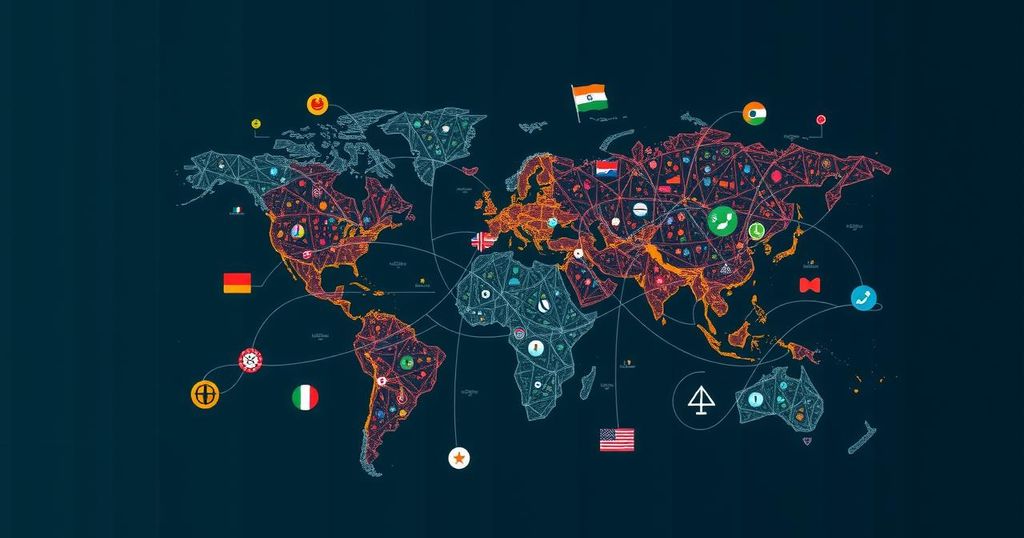Modi’s Human-Centric Foreign Policy: Elevating India’s Global Stature

Prime Minister Narendra Modi’s foreign policy asserts India’s role as a key global player through a human-centric, consensus-driven approach. His tenure has transformed India into a proactive actor in international affairs, emphasizing humanitarian outreach and resilience in the face of multilateral challenges. Modi’s strategies involve balancing military preparedness with constructive diplomacy, particularly concerning relations with neighboring countries and larger powers, while advocating for sustainable development and engagement in key global issues.
India’s foreign policy, under Prime Minister Narendra Modi, pivots on a human-centric approach, striving to position India as a significant global player while promoting regional stability and consensus building. Modi integrates traditional Indian values of dharma and vasudhaiva kutumbakam, emphasizing duty and the notion of the world as one family. Throughout his tenure, he has transformed India from a passive observer in international affairs into an influential actor, particularly addressing multilateral challenges and fostering a proactive diplomatic strategy. Modi’s administration has highlighted India’s economic prowess and humanitarian outreach, positioning the nation as a first responder to global crises. Notably, in areas of pandemics and natural disasters, India has demonstrated its commitment to international exigencies, advocating for dialogue over warfare during his G20 presidency. By navigating complex geopolitical landscapes—balancing relationships with powers like China and Pakistan while maintaining a robust military posture—Modi’s government has shown a remarkable ability to engage in diplomacy without compromising national security. Challenges persist regarding historical tensions with neighboring countries. Modi’s strategy incorporates a zero-tolerance stance on terrorism and a willingness to employ decisive military responses when necessary. This approach has altered the contours of India’s relationship with Pakistan, where past grievances must be addressed to cultivate productive dialogue. Modi’s recent dialogues during pivotal summits, such as with Xi Jinping, reflect an ambition for normalized relations and economic collaboration, contingent on resolving border disputes and trade imbalances. India’s commitment to sustainable development during its G20 presidency underlines Modi’s forward-thinking vision, as the nation exceeds its Paris Agreement commitments and champions equitable green transitions. This, combined with advancements in digital technology, positions India to offer valuable resources to other nations. However, opportunities arising from global economic shifts necessitate strategic engagement in regional trade frameworks to bolster India’s economic standing. The geopolitical landscape, influenced by conflicts in Ukraine and Gaza, has created challenges for India, particularly with propagandistic narratives that question its internal and external policies. Modi’s firm stance on these issues resonates with the Indian diaspora, which largely supports a vision for a developed India. Through adept navigation of international waters, Modi has pursued a foreign policy founded on strategic pragmatism while advocating for a more inclusive international order. The effectiveness of this strategy depends on collaboration with key global powers and sensitivity to emerging geopolitical realities. Ultimately, India’s trajectory under Modi indicates a significant ascent in international relations, marked by a values-based approach aligned with global development challenges, enhancing India’s stature as a major player on the world stage.
In recent years, India has sought to redefine its role in global affairs, significantly under Prime Minister Narendra Modi’s leadership. This shift is characterized by an emphasis on building a consensus around India’s growing economic and strategic significance. Modi’s government has focused on enhancing India’s global reputation through humanitarian efforts and diplomatic engagement, asserting itself confidently against historical adversities and redefining its relationships with neighboring countries. The context of a rapidly changing geopolitical landscape, particularly regarding the rise of China and persistent challenges rooted in terrorism, further complicates these efforts. Modi’s approach marries traditional principles with contemporary diplomatic needs, reflecting a holistic vision for India’s future on the international stage.
In conclusion, Prime Minister Modi’s foreign policy is marked by a human-centric lens that emphasizes consensus and regional stability. By transforming India into a proactive global player, Modi demonstrates a commitment to addressing intricate geopolitical challenges while advocating for sustainable and equitable development. The strategic balancing of military readiness and diplomatic engagement positions India favorably as it navigates the complexities of international relations, with a firm foundation rooted in values reflective of Indian civilization. As India continues to rise, the focus on collaboration and dialogue will be critical in shaping its legacy in global diplomacy.
Original Source: www.hindustantimes.com








